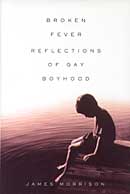|
|
||||||
| Excerpts: | ||||||
|

![]()

 From "Initiate"
From "Initiate"
from Broken Fever
By James Morrison
Drama was metamorphosis, but gym, for all the hurdy-gurdy motion it decreed, was bleak stasis. In space, the gym was right across the hall from Drama, but in spirit it might have occupied another world. Congruities between Drama and gym -- both convened in big, echoey rooms, both diverged from the typical routines of school, both called for energetic activity -- could never bridge the real distance between them. Executing toilsome calisthenics on the hard floor of the gym, I'd try to convince myself that these exercises were really no different from the warm-ups of Drama, which I loved. Why then could I not coax myself to love these too? The answer, of course, was that Drama's wonder was to release one from the body, gym's burden to return one to it, irrevocably. Push-ups exacted a direct and ineluctable relation to the cold, hard floor, sit-ups to the high, unreachable ceiling. In both cases, a vexatious repetition, strictly enforced, mimicked rigor. Over and over, the ground pulled you back down, but the lofty, raftered ceiling did nothing to raise you up: all space was against you, but there was no escaping the brute fact that space -- base, physical space -- was exactly and only where you were, pushing yourself gracelessly up off the floor, or straining upward toward that far-off ceiling, or at least to a partly sitting position, and colliding at every turn with gravity's blunt, mocking hostility. The Swann twins circulated among us, gruffly vigilant, as we did our calisthenics, and every so often they yelled, "Bend those knees!" or "Down with that butt!" Calisthenics humiliated, all things considered, not so much in the unendurable strain that proved the terrible inadequacy of one's own strengths, though in that too, but in the whole callous, confining ethic of the corporeal, as if it were the only thing that was real, as if anything else were only a sissy's subterfuge.
Gym entailed games, but its atmosphere could never have been mistaken for that of play. The games were brutal and primal. The ones who loved gym -- Bobby Adams, for instance, who seemed to have been born to it -- loved most this worship of the primitive that was so intrinsic to the dogma of gym; the stripping away of street clothes, the donning of the shorts and the tee shirts, the choosing up of sides, as if tallying a binding list of the fittest apt to survive, or as if, leaping into the ferocious carnage of the game, making ready for that inevitable time when the false veneer of civilization would crumble, and we would be restored to that primordial condition, of which gym gave a taste as tantalizing to some as the tang of the enemy's blood, that was really our natural state. The romance of the corporeal was one thing, but this rhetoric of the "natural" that permeated all quarters of gym was really too much. For all the blather about the team spirit and self-reliance that were gym's putative educational justifications -- a crude sanctimony -- I knew it was really all about self-gain and self-righteousness, and another of its congruities with Drama, its highly theatrical dimension, revealed exactly how this was the case. Drama was for sissies, went the conventional wisdom, because it turned on pretense; gym made us real men, because it repudiated pretense. What was clear to me, though -- but still couldn't' be called on to overcome my loathing of gym -- was that, in a very direct way, gym was theater. The shorts and tees were costumes, the games intricate, ragtag performances, and the whole arrangement depended on an elaborate system of learned codes and artificial conventions. Success or failure in gym depended not on the ability to learn these codes, for everyone knew them implicitly, but on the ability to enact them as if they were natural. We were supposed to call each other, in gym, only by our last names, as if who we were were only lineage; but some could shout these names with the wild, savage inflections of real conviction, while others, like myself, when they could muster them at all, could summon them only tentatively, preferring the individual stamp of the first name to the prototypical standard of the last name. Even the shouts of encouragement were like litanies in a foreign tongue: "Good hustle, good hustle!" or "Way to toss, way to grab!" By the same token, some could master, say, sit-ups, or push-ups, as if they were really innate functions of the body, not aberrant, unnatural exercises, while others could never, say, recite the potty-mouth diatribes the ones who were good in gym spouted spontaneously and incessantly in the midst of the games, with that berserk rage that proved they really meant it. Drama enabled you to perform another identity as your own, while gym compelled you to perform your own identity as another; and if, in gym, the self was a trap, in Drama it was a door.
Copyright © 2001
James Morrison
 Back
to the Stonewall Inn
Back
to the Stonewall Inn
